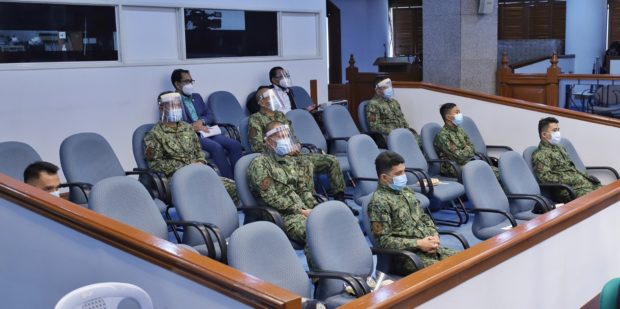
A MATTER OF TRUST Policemen involved in the killing of four soldiers in Jolo, Sulu, on June 29 appear before the Senate committee on public order and dangerous drugs on Wednesday. —PHOTO COURTESY OF SENATE PUBLIC RELATIONS AND INFORMATION BUREAU
MANILA, Philippines — The killing of four Army intelligence officers by nine policemen in Jolo, Sulu, on June 29 may have been caused by distrust between operative of the Armed Forces of the Philippines and the Philippine National Police, senators said on Wednesday.
“The problem is that you ground operatives do not see eye to eye. You do not personally know one another. All of you operate in one small area of Jolo, yet you do not know one another,” Sen. Ronald dela Rosa, chair of the Senate committee on public order and dangerous drugs.
Dela Rosa pointed out that the military in the area distrusted policemen because some of them have relatives in the Abu Sayaff group while the police have suspicions that some military officials have ties to illegal drugs.
Murder determined
At the same hearing, the National Bureau of Investigation affirmed that the killing of four Army officers — Maj. Marvin Indammog, Capt. Irwin Managuelod, Sgt. Jaime Velasco and Cpl. Abdal Asula — constituted multiple murder.
Lawyer Zulikha Degamo of the NBI’s death investigation division told senators that they had witnesses who testified that Indammog, the ranking official in the group, was unarmed when he got off their sport utility vehicle contrary to the claims of the nine policemen tagged in the killing.
“Maj. Indammog at that time raised his hand, and according to our witnesses, he also lifted his T-shirt to show that there was nothing tucked or anything in his waist, perhaps like a weapon,” Degamo told the senators.
Still no charges
The NBI recommended the filing of murder charges against nine Jolo policemen — Police Senior Master Sergeant Abdelzhimar Padjiri; Police Master Sergeant Hannie Baddiri; Police Staff Sergeants Iskandar Susulan, Erniskar Sappal and Almudzrin Hadjaruddin; Police Cpl. Sulki Andaki; and Patrolmen Moh Nur Pasani, Alkajal Mandangan and Rajiv Putalan.
AFP chief Lt. Gen. Gilbert Gapay, who was also present during the hearing, urged that criminal charges be filed against the policemen immediately.
“This was a deliberate act. There was an intent to kill, but we cannot ascertain the motive, but definitely there is an intent to kill,” Gapay said, citing that the slain soldiers all had bullet wounds on their backs.
“We urge the immediate filing of murder, planting of evidence and neglect of duty charges as recommended by NBI to the proper court immediately. We have been waiting for two months already and justice delayed is justice denied,” he added.
Not an isolated case
Indammog and his men, members of the Army’s 9th Intelligence Service Unit, were pursuing suspected suicide bombers who lived in a boarding house in the vicinity of the Jolo police station when they were accosted by the policemen at a checkpoint.
The policemen insisted during the hearing that the soldiers were killed in a shootout despite the testimony of witnesses.
Sen. Risa Hontiveros, who filed Senate Resolution No. 460, to investigate the incident, described the killing as a “cold-blooded murder.”
“The most painful part is when the soldiers said ‘tropa tropa,’ yet they were killed. This is nothing if not cold-blooded murder,” Hontiveros told the hearing.
The senator said “the killing in Jolo is not an isolated case of police excesses,” citing the death of former soldier Winston Ragos and the “fabricated” drug operation in San Jose Del Monte, Bulacan, by the police.

